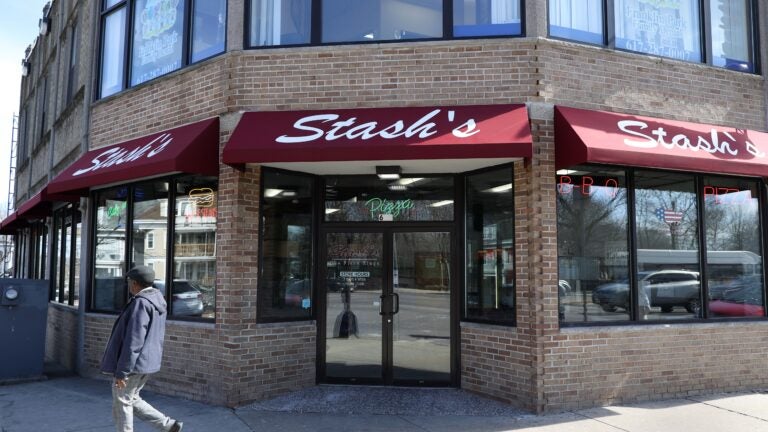Stash’s Pizza must pay $105,000 after employee called woman racist slurs, state commission rules
Boston Pizza #BostonPizza

Local News  Stash’s Pizza on Blue Hill Avenue. Jonathan Wiggs/Globe Staff
Stash’s Pizza on Blue Hill Avenue. Jonathan Wiggs/Globe Staff
The Massachusetts Commission Against Discrimination has ordered a Boston pizza shop to pay a customer $105,000 in emotional damages after an employee called her racist slurs and threatened to physically hurt her, according to court documents.
The decision was made by Hearing Officer Jason Barshak and announced in January, the Dorchester Reporter first reported. The decision said Stash’s Pizza is liable for an October 2020 incident where, Barshak wrote, an employee went on a racist rant against an African American customer when she tried to report bad customer service to a manager at the restaurant.
The incident started with the woman calling Stash’s Pizza on Blue Hill Avenue in Dorchester to order a large cheese pizza. When she arrived to pick up her order, a white man behind the counter told her they did not have an order under her name and offered her a small cheese pizza instead, saying “‘you can take it or leave it’ in a loud and rude manner,” according to the complaint.
After the customer left the restaurant to get food elsewhere, she decided to call Stash’s to report the incident, which she thought was based on her race, to a manager, the complaint said.
The same man who was behind the counter answered the phone and told her to “come here” so “I can put a bullet in your head.” He also called her a [N-word] several times, leaving the woman “shocked,” the court filing said.
Convinced it was the wrong number, the woman called the restaurant back several minutes later. When she did, the same man answered and told her to “Stop calling me you [f–ing N-word],” according to documents. When she called a third time, the man asked her whether she knew “‘how many [N-word]s like you get hung’ at Franklin Park,’” which is across the street from the restaurant.
The woman started crying at this point as she “started thinking about how Black slaves had been hung from trees,” according to court documents. Minutes later, she received a text message from a different number — not the one she’d been calling to reach Stash’s — that said “f–ing [N-word].”
When she called the number that texted her, the same man who she’d been speaking to answered and told her that he was “off work,” “ready to hang a [N-word],” and asked her where she was, according to the court filing.
Barshak ruled that the same person who sent the text message — and had been answering Stash’s phone — was the man the customer first encountered behind the pizza shop counter, and that he was an employee with the establishment.
At the end of October, the woman filed a report with Boston police about the incident. When they went to the pizzeria, a manager told them that the employee involved in the incident had been fired.
The person behind the counter was not identified in court documents, though Barshak found that it was not store owner Stavros Papantoniadis. Papantoniadis was arrested in March of last year and is charged with several counts of forced labor relating to hiring people without immigration status at his restaurants while forcing them to work overtime and underpaying them. He also physically and emotionally abused employees, threatening to deport them if they said they wanted to quit, according to the U.S. Attorney for Massachusetts.
Barshak found that the event had a “prolonged, pervasive and severe adverse impact on the woman’s emotional and mental health,” he said in his decision. She struggled with nightmares and panic attacks and experienced a personality shift after the incident, court documents said.
Stash’s Pizza tried to argue that the man was not in his official capacity as an employee at the time of the incident because the woman’s calls were made after the restaurant’s closing time of 1 a.m. Per the store policy, employees are not allowed to answer the phone after the restaurant’s closing time, according to documents.
However, Barshak rejected the argument and ruled that “interacting with a patron about customer service falls within the scope of employment duties” and that breaking store policy does not negate liability on behalf of Stash’s.
In compensation for emotional damages, the court ordered Stash’s Pizza to pay the woman $105,000, but said she failed to prove the incident affected her ability to work.
Despite this, Barshak said in his decision that she was clearly emotional and distressed during testimony at the hearing and needed to take a break several times. She was also diagnosed with complex-PTSD after the incident, documents said.
The woman involved “genuinely believes that someone associated with Stash’s Pizza is seeking to harm her,” Barshak wrote in his decision. “Despite treating with clinicians, and taking medication prescribed, the intense mental and emotional hold that the incident continues to have on (her) was apparent during the hearing.”
Newsletter Signup
Stay up to date on all the latest news from Boston.com